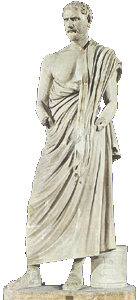
DEMOSTHeNES
Speech Composer
Information
Features
The system
Samples
Downloads
Mailing list
Publications
The rhetor
Contact
Gerasimos Xydas
gxydas@di.uoa.gr
Last updated:
3 May 2004
The rhetor
by Electra Boli
Demosthenes

Athenian rhetor and politician. He was born at 384/383 B.C. and he was active in the political life of Athens since the middle of the 4th century B.C. and onwards. When he was seven years old his parents died. His upbringing and the management of his fortune were entrusted to three guardians, who embezzled a great part of it. As soon as Demosthenes reached his majority and with the help of the orator Isaios, he took legal action against the embezzlers. Despite these legal fights he was not able to retrieve his fortune, he had the chance however to practice in rhetoric and speaking in front of a court. In this way he was able to overcome his natural disabilities, meaning the weakness of his voice and his stammer. His will was so strong that, according to Plutarch, he put small pebbles in his mouth while he was reciting his speeches, in order to improve his articulation. Fortunately, Demosthenes' efforts were fruitful and he became a great orator and politician. He stood against Philip's expansive policy towards southern Greece and with his speeches he tried to convince the Athenians to take action in order to maintain their independence. His efforts however failed and Athens was defeated by Philip in the battle of Chaironia at 338 B.C. A few years later Demosthenes gave a review of his political career in his speech 'On the crown' and he was vindicated by the People's Assembly, later though he was accused of embezzling money (Arpalos case), he was convicted to pay a fine, which he was not able to pay and he escaped from Athens. After the death of Alexander the Great (323 B.C.) and while he was on exile, he took part in a revolt against Macedonia organized by Athens and other city-states of the Peloponnese. After that his conviction was recalled and he returned to Athens. The Macedonians with Antipatros reacted upon this revolt, they invaded Athens and they sentenced to death the principal participants in the revolt, among them Demosthenes. He took refuge at Kalavria (the present island of Poros), where he was persecuted and he decided to give an end to his life by drinking the conium, which was hidden in his pen. Sources:
|
